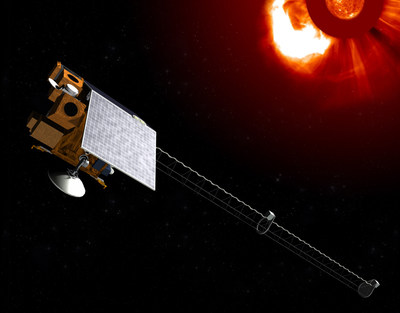BOULDER, Colo., July 29, 2021 /PRNewswire/ -- Ball Aerospace successfully completed the preliminary design review (PDR) for the National Oceanic and Atmospheric Administration's (NOAA's) Space Weather Follow On-Lagrange 1 (SWFO-L1) spacecraft. With PDR complete, the spacecraft now moves into the critical design phase.
Ball was awarded the contract to design and build the SWFO-L1 spacecraft on June 25, 2020 by NASA's Goddard Space Flight Center on behalf of NOAA. SWFO-L1 is an operational mission that will collect solar wind data and coronal imagery to meet NOAA's operational requirements to monitor and forecast solar storm activity. SWFO-L1 will be launched to an L1 orbit, which will allow for upstream solar wind measurements and continuous unobstructed observation of the sun's corona without interference from the Earth.
"Space weather events, such as solar flares, coronal mass ejections and other high-energy emissions from the sun, can endanger astronauts in space, interfere with satellites and damage communications and power grid infrastructure, causing significant economic impact," said Dr. Makenzie Lystrup, vice president and general manager, Civil Space, Ball Aerospace. "Once on orbit, SWFO-L1 will provide the nation with critical space weather information to help protect life and property and we are excited to partner with NOAA and NASA Goddard on this important mission."
The SWFO-L1 spacecraft is based on the Ball Configurable Platform (BCP), which is a customizable and proven spacecraft, designed for flexible, cost-effective applications, using a common spacecraft bus and standard payload interfaces to reduce cost, streamline payload accommodation and minimize delivery time. Ball has a heritage of building spacecraft for NOAA's operational weather missions, including NOAA-20 and the Suomi National Polar Orbiting Partnership (Suomi NPP).
Powered by endlessly curious people with an unwavering mission focus, Ball Aerospace pioneers discoveries that enable our customers to perform beyond expectation and protect what matters most. We create innovative space solutions, enable more accurate weather forecasts, drive insightful observations of our planet, deliver actionable data and intelligence, and ensure those who defend our freedom go forward bravely and return home safely. Go Beyond with Ball.® For more information, visit www.ball.com/aerospace or connect with us on Facebook or Twitter.
About Ball Corporation
Ball Corporation (NYSE: BLL) supplies innovative, sustainable aluminum packaging solutions for beverage, personal care and household products customers, as well as aerospace and other technologies and services primarily for the U.S. government. Ball Corporation and its subsidiaries employ 21,500 people worldwide and reported 2020 net sales of $11.8 billion. For more information, visit www.ball.com, or connect with us on Facebook or Twitter.
Forward-Looking Statements
This release contains "forward-looking" statements concerning future events and financial performance. Words such as "expects," "anticipates," "estimates," "believes," and similar expressions typically identify forward-looking statements, which are generally any statements other than statements of historical fact. Such statements are based on current expectations or views of the future and are subject to risks and uncertainties, which could cause actual results or events to differ materially from those expressed or implied. You should therefore not place undue reliance upon any forward-looking statements and any such statements should be read in conjunction with, and qualified in their entirety by, the cautionary statements referenced below. The Company undertakes no obligation to publicly update or revise any forward-looking statements, whether as a result of new information, future events or otherwise. Key factors, risks and uncertainties that could cause actual outcomes and results to be different are summarized in filings with the Securities and Exchange Commission, including Exhibit 99 in our Form 10-K, which are available on our website and at www.sec.gov. Additional factors that might affect: a) our packaging segments include product capacity, supply, and demand constraints and fluctuations and changes in consumption patterns; availability/cost of raw materials, equipment, and logistics; competitive packaging, pricing and substitution; changes in climate and weather; footprint adjustments and other manufacturing changes, including the startup of new facilities and lines; failure to achieve synergies, productivity improvements or cost reductions; unfavorable mandatory deposit or packaging laws; customer and supplier consolidation; power and supply chain interruptions; changes in major customer or supplier contracts or loss of a major customer or supplier; political instability and sanctions; currency controls; changes in foreign exchange or tax rates; and tariffs, trade actions, or other governmental actions, including business restrictions and shelter-in-place orders in any country or jurisdiction affecting goods produced by us or in our supply chain, including imported raw materials; b) our aerospace segment include funding, authorization, availability and returns of government and commercial contracts; and delays, extensions and technical uncertainties affecting segment contracts; c) the Company as a whole include those listed above plus: the extent to which sustainability-related opportunities arise and can be capitalized upon; changes in senior management, succession, and the ability to attract and retain skilled labor; regulatory actions or issues including those related to tax, ESG reporting, competition, environmental, health and workplace safety, including U.S. FDA and other actions or public concerns affecting products filled in our containers, or chemicals or substances used in raw materials or in the manufacturing process; technological developments and innovations; the ability to manage cyber threats; litigation; strikes; disease; pandemic; labor cost changes; rates of return on assets of the Company's defined benefit retirement plans; pension changes; uncertainties surrounding geopolitical events and governmental policies both in the U.S. and in other countries, including policies, orders, and actions related to COVID-19; reduced cash flow; interest rates affecting our debt; and successful or unsuccessful joint ventures, acquisitions and divestitures, and their effects on our operating results and business generally.
SOURCE Ball Aerospace


